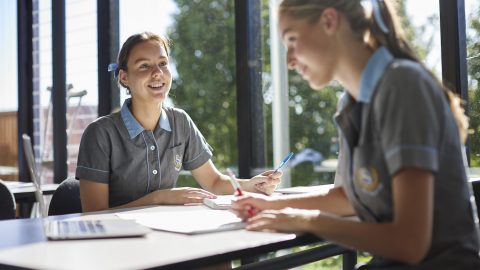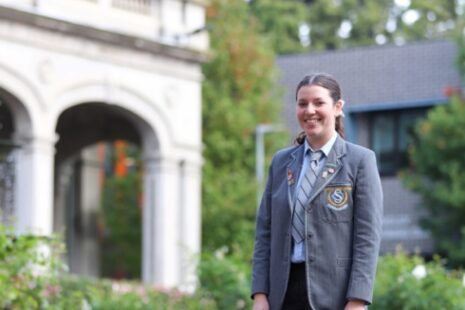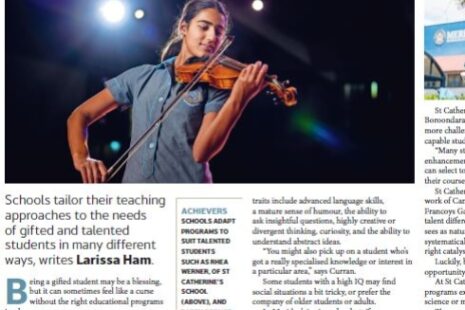Top Tips for Effective Study

While our Year 12 students are well rehearsed at their study techniques, I thought it timely to remind families of essential study tips that will provide younger daughters and their parents a good dinner time discussion. The below list of Study Tips is provided by Melbourne Psychologist, Andrew Fuller who has presented at St Catherine’s Parent Seminars in recent years. I encourage parents to continue conversations with their daughters about how they are approaching their study and use Andrew’s tips as your reference.
- Study in silence
This is the single most powerful way to increase your marks. No texting, music, or computer screens. Outcomes improve when you practise in the same conditions you want to perform in. In the exam room there will not be music, mobile phones or computer screens.
- Organise & transform the information you want to learn
Just reading your notes repeatedly does not work. Your memory stores information best when you organise or transform it. This means organising your notes so that the main idea is highlighted on each page. Then take your notes and turn them into a flow chart or a mind map or see if you can fit them to a song you know well, or make it into a sound recording. The more times you can transform and reorganise the information the more firmly it is remembered.
- Put off pleasurable activities until work is done
This is a painful one but if you play computer games before you get down to studying, the levels of dopamine in your brain lessen and you will lose the drive and motivation you need to study effectively. Work first play later.
- Talk yourself through the steps involved
One of the things that highly successful students do is explain out loud to themselves the steps involved in completing a task. This applies to every subject area. By saying out loud, “First I have to do…. Then I have to do….” and so on, any part that you are uncertain about becomes clear and you can then use this to guide where you need to do more.
- Ask for help
Teachers want their students to be interested and to do well. You will be amazed if you ask a question how many other people do not understand it either. If you are scared about asking questions in class, talk with your teacher about this or email them with your question.
- Write & re-write key points
Writing the main points of the area you are learning helps you to remember them. If you can add in re-organising and transforming them into different formats (drawings, flow chats, podcasts etc.) that makes it even more powerful.
- Make lists & set priorities
Make a “to-do” list each week. Write down in your diary the most important things to be done in each subject each week. High scoring students do a little bit on each subject, rather than doing a lot of work on one subject every so often. If you are doing subjects that involve presenting a folio or preparing a presentation, it is still important to do work on the other subject areas.
- Keep a record of how much study you have done
It increases motivation when we can tick things off lists and when we can see how much we have done.
- Test yourself
Your memory and understanding are strengthened when you create tests for yourself. Give yourself a test so you can focus more time on learning the parts you do not fully understand or recall. Your practice tests should replicate the exam in length, environment, and format. For example, if you must write a 250-word response, practise this in a timed trial.
- Set study times
Decide when you are most alert and set aside some time at that time of day to study. If you wait until you are in the right mood before beginning to study, you may wait forever. There are no exams scheduled at 9pm at night – so don’t study at this time of the day. Be mindful of your body clock – maintain a school routine. Wake up as though it is a normal school day!
- Exercise
Memories seem to be strengthened when you do some exercise about four hours after a study session. Exercise also lowers your stress levels.
- Chunking
Research tells us that the human brain is not able to cope with more than seven to nine chunks of information at any one time. When we are confronted with a much larger body of information to store, know and retrieve, we need to orgainse it in chunks of no more than seven to nine items.
A key strategy to doing this is to classify and reorganise information. Most of us do this when we have to memorise phone numbers – it is much easier to remember 91735638 by chunking it – 9173-5638. Chunking has important implications for study and revision. So, suggest to your daughter that she:
- Reduces the information to be studied by reorganising it into categories ideally five to nine (Chunking)
- Chunk summaries of these categories into no more than nine bullet points
- If more than nine summary points are required, classify the information into smaller, logically related groups and introduce subheadings to summary points (chunking the chunks)
- Use no more than nine bubbles on a single concept map or mind map. Each bubble should contain no more than five to nine chunks of information
- Finds patterns in the information that need learning and organise the information into these patterns. For example, in the following list of grocery items: cereal, soap, shampoo, eggs, toothpaste, bread, bacon, it is easier to memorise the items if they are chunked and patterns are associated with the chunks i.e., ‘cereal and toast, bacon and eggs for breakfast’ and ‘toothpaste, soap and shampoo for clean mouth, hair and face.’

The mental work of toggling back and forth from schoolwork to social media is where students risk sacrificing their best abilities
Finally, a conversation about social media use, as difficult as this can be, is necessary. Whilst multitasking is not a problem if a student wants to be on Instagram while watching television or listening to music while playing a video game, but when students are doing serious exam study, they must have focus. Texting, e-mailing, and posting on social media are mentally complex, drawing on the same brain resources (like using language and discerning meaning) as schoolwork.
The mental work of toggling back and forth from schoolwork to social media is where students risk sacrificing their best abilities. It seems like only a few seconds of interruption, but it takes time to re-engage and get back into the flow. This ‘dislocation’ is a problem as we get fatigued from the effort of repeatedly bringing our minds back to a task. Thus, one hour of homework can take two to three hours yet be more exhausting—but the effort is not from the work itself, but the work of constantly re-focusing. The phone should be placed away from the desk, and preferably in a different room.





